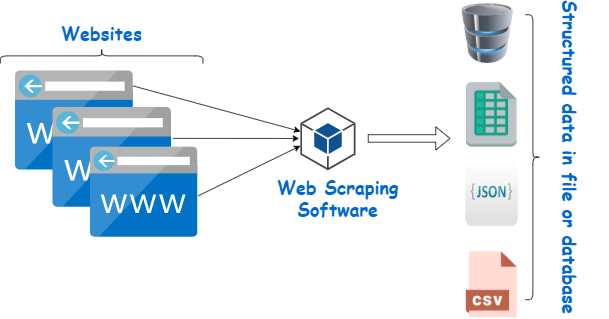What Is Web Scraping and Why Do Software Developers Use It?
Here is an overview of the basics of web scraping, as well as an examination of why some developers are committed to web scraping in a major way.
Join the DZone community and get the full member experience.
Join For FreeWeb scraping is often discussed in software development circles, but not everyone knows about it or has anything more than a superficial understanding of its ins and outs. With that in mind, here is an overview of the basics, as well as an examination of why some devs are committed to web scraping in a major way.
An Overview of Web Scraping
Web scraping is a method for achieving automatic data extraction from websites. It involves programming a piece of software to visit desired web pages and gather specified information. This may include text content, images, links, or any other type of structured data that resides on these sites.
Afterward, this collected information is either stored for later analysis or directly processed, depending on the user's preference. Through simulating human navigation across the internet at high speed and scale, special tools outperform manual methods in terms of efficiency.

The Technical Mechanics Behind Web Scraping
The process of web scraping typically starts with the scraper making a request to the targeted website's server, much like any human user would do via their browser.
The difference lies in what happens next. Instead of rendering and displaying all incoming HTML code visually for an end-user to interact with, scrapers scan through this raw code line-by-line, looking for specific tags or data patterns that contain the required information.
Once located, the scraper extracts this underlying data from within these identified sections of code and tidies up atypical formatting or extra clutter before storing it efficiently.
All this takes place behind the scenes without any visual cues, which makes scrapers incredibly powerful tools that are adept at gathering relevant internet data swiftly and effectively.
Why This Matters for Software Developers
Web scraping offers multiple benefits, especially for software developers. Let's take a look at some of the key reasons why it has become a popular technique in this sphere:
- Data gathering and analysis: Big data is changing business dynamics worldwide by offering crucial insights into customer behavior, market trends, and competitor strategies. Web scraping allows developers to collate vast amounts of relevant online data quickly.
- Automating data entry tasks: Manual data entry or extraction can be laborious and prone to errors. With web scraping tools, this process becomes automated, increasing accuracy levels.
- Feeding machine learning algorithms: For artificial intelligence models to perform efficiently, particularly machine learning algorithms, large datasets are required for training purposes. Web scrapers facilitate the accumulation of such data from various diversified sources across the internet.
- Content aggregation: By extracting content from multiple sites concurrently, aggregated feeds or databases can be created effortlessly, which would have been time-consuming when performed manually.
The utility of web scraping for software developers is quite evident, given its wide applications spanning many areas instrumental in driving digital innovation today.
Finding the Right Web Scraping Tool for Your Needs
Choosing an appropriate web scraping tool often depends on personal preference, proficiency level, and specific project needs. Here are some great options you might consider:
- Python-based tools: Python comes with multiple libraries, such as Beautiful Soup or Scrapy, that offer robust and versatile ways to scrape data.
- Browser extensions: For those with limited coding knowledge, browser extensions like Data Miner can be ideal for simpler scraping tasks.
- Web scraping services: If your requirements are extensive, commercial web scraping services like Import.io provide comprehensive solutions handling everything from extraction to saving of data.
Moreover, today's tech allows even more convenience, and you can even use a web scraping API to streamline and integrate this process more comprehensively with software projects. Such APIs take care of all back-end operations while letting developers focus on what they do best. You can just call up these designated endpoints within your code and receive the required JSON/XML formatted online data directly.
Common Challenges in Web Scraping and How To Overcome Them
Web scraping does come with some hurdles. Yet, with a solid strategy in place, these common issues can be tackled:
- Website structure changes: Sites frequently update their layout, causing scrapers to break. Regular maintenance of your scraping code is necessary.
- Dynamic content: Many modern websites use Javascript to load content dynamically, which traditional scrapers struggle with. Utilizing tools such as Selenium or Puppeteer that emulate user interactions can help fetch this data.
- IP Blocks: Websites sometimes block IP addresses showing unusual activity, like those being used by a scraper. Using proxies can help bypass this limitation.
Web scraping may pose challenges initially, but with an arsenal of the right skills and tools, these stumbling blocks aren't impossible to overcome.
Final Thoughts
Whether or not web scraping is necessary for your next software project, having these fundamentals in your back pocket will be useful for informing the decisions you make and the conversations you have with the wider dev community.
Opinions expressed by DZone contributors are their own.

Comments